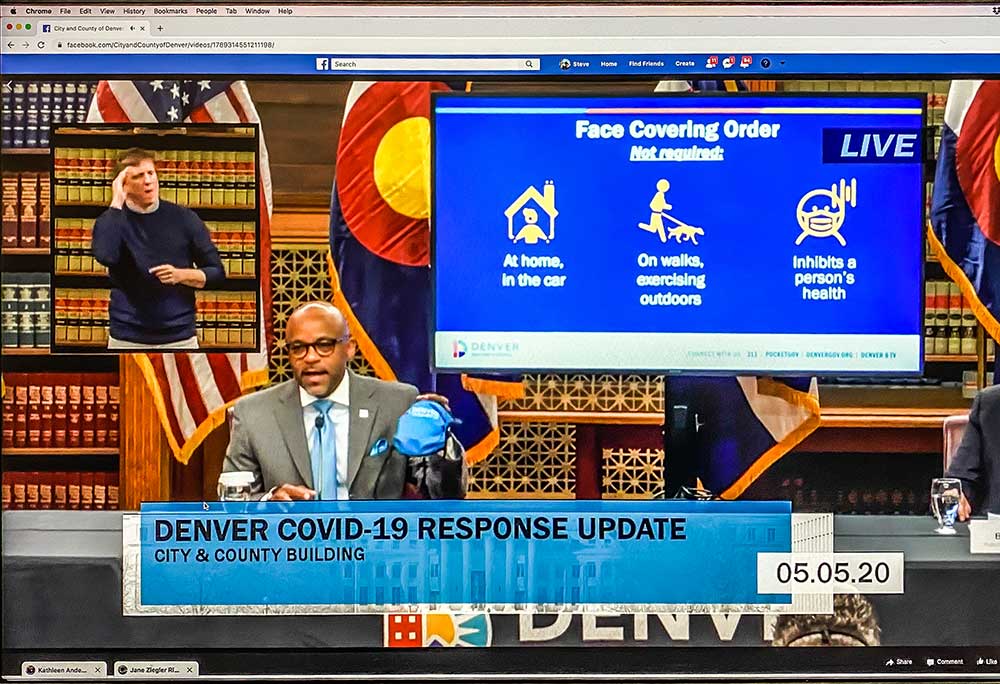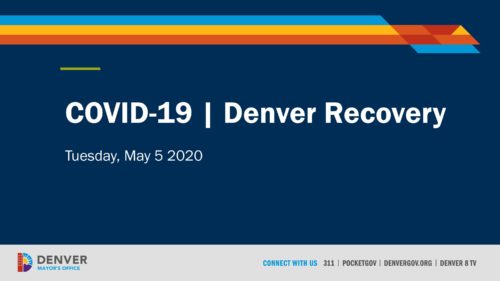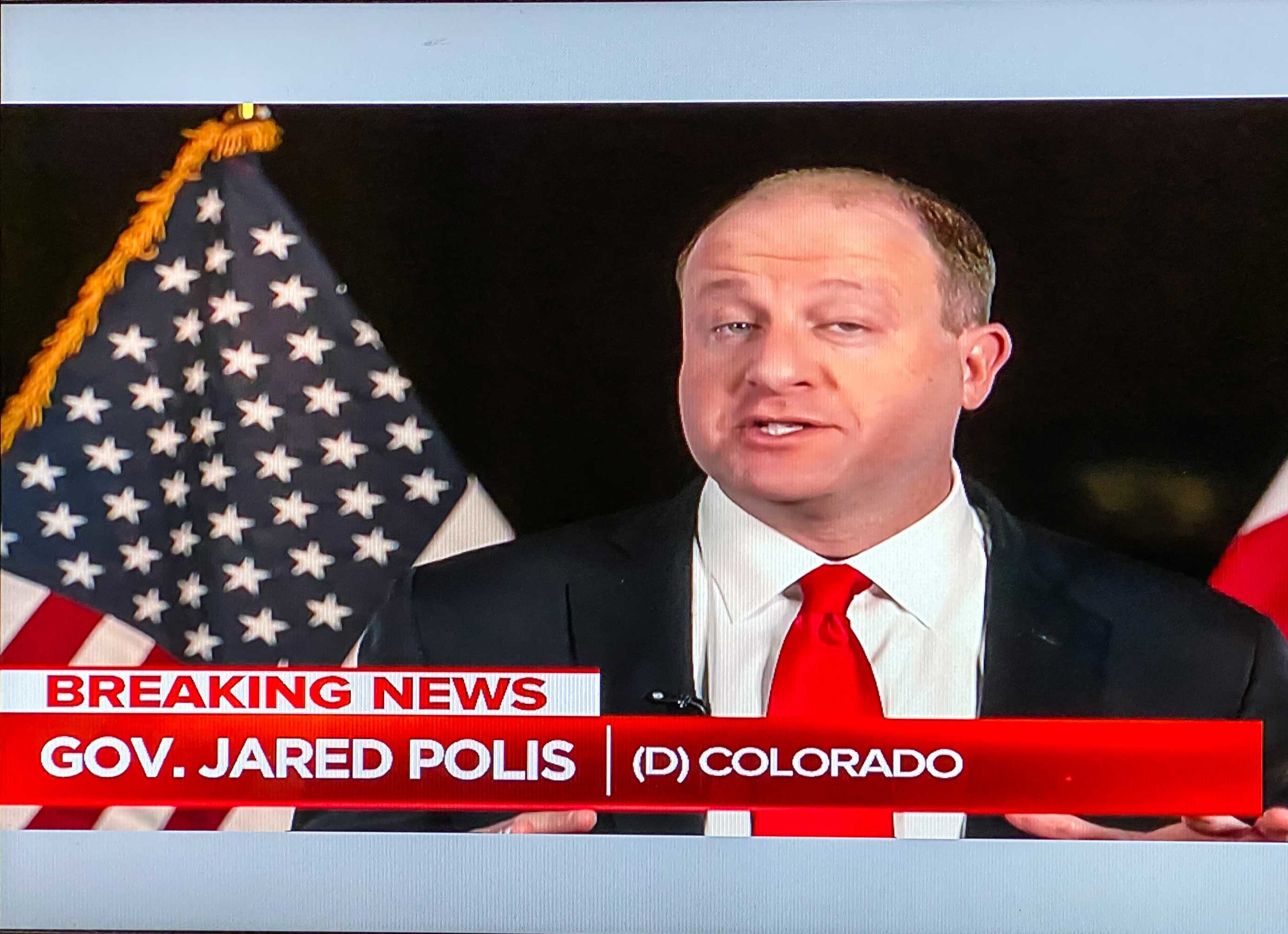07/14/20 Governor uses strong language referring to those who don’t wear masks
Ryan Warner, on CPR this morning, asked Governor Polis about this Facebook post he made recently: “So if you’re a selfish bastard and wearing a mask to protect others isn’t enough reason to do so, then maybe protecting yourself is?”
Polis’s response: “I think I have what a lot of Coloradan’s have — less and less patience for people who are not wearing mask. I mean, they’re putting others at risk…obviously they don’t care about others because they’re not wearing masks. The point I was trying to make is it’s not just about others…the latest science from the last few weeks shows very conclusively…that wearing a mask increases your own protection and reduces your risk of getting the virus by two-thirds if you’re exposed.
“The definition of bastard is an unpleasant or despicable person, so that was obviously the meaning that was meant there. It’s absolutely despicable to not take any precaution to prevent you from spreading the virus to others when we know that about half of transmission occurs from people who are asymptomatic, before they manifest symptoms or have asymptomatic infections. That is a completely inappropriate way to act.”
“My goal and my desired outcome is to maximize mask wearing to reduce the spread of the virus and allow for an economic recovery.”
5/27/20 CO Public Health Allows Additional Business Openings
The Safer at Home Executive Order has been amended and extended until June 1, 2020. According to that order, additional businesses can open with abundant precautions. This includes:
- Private campgrounds, effective May 25.
- Dine-in at restaurants, effective May 27.
- Day camps and sports camps for kids, effective June 1.
- Curbside service at libraries.
- Personal training at pools (indoor pools may have no more than 4 people).
Colorado is asking everyone to wear a face covering while out in public for necessary activities like grocery shopping, going to work or walking your dog and for social activities you choose to participate in… use it whenever you are outside your own house or yard.
People at higher risk of severe illness from COVID-19 are urged to continue to stay home except for necessary medical care, and the general public is encouraged to stay at home as much as possible and limit social interactions. The public is also advised to wear masks or face coverings when leaving their home.
People who are sick, or have a household member who is sick with COVID-19 like symptoms, should still stay home from work and limit social interactions as much as possible. For more info visit covid19.colorado.gov.
Click here to read the Safety Guidelines for Restaurants, Summer Camps and Private Camping
Free testing at Pepsi Center starting 5/22/20
A free City of Denver drive-up testing site has been set up at the Pepsi Center. People with COVID-19 symptoms can get tested starting Friday, May 22, with the site open from 8am to 4pm daily except holidays. Denver has set a goal of 500 tests per day at this site, with increased capacity depending on demand.
Individuals will be responsible for administering the nasal swab themselves to expedite the process and increase safety. Those unable to administer the swab themselves due to a disability will receive staff assistance.
To receive a test, residents should register first at denvergov.org (a testing link is on the home page) and bring a document that verifies their name such as a photo ID (current or expired), RTD pass, EBT card, school ID, phone or utility bill, or library card. Minors may be registered by their parents.
Name verification is necessary to identify individuals who have been tested multiple times. Results will be provided online within 72 hours, and those who test positive will receive follow up from the Denver Department of Public Health & Environment (DDPHE) for contact tracing purposes. Those without internet access can call 311 for help registering.
The testing site is in the parking lot on the west side of the Pepsi Center, 1000 Chopper Circle. Cars should enter on 7th Street at the intersection with Auraria Parkway. Because testing is primarily for individuals with symptoms, walking or biking up to the site is discouraged
Governor Polis Announces Broad Testing Starting 5/18 20
Today, Governor Polis announced that Colorado now has the supplies, the testing sites, and the capacity to test anyone showing symptoms of COVID-19, as well as all health care workers, all senior care facility workers, all first responders, and all essential workers who directly interact with the public while working, whether or not those individuals have symptoms or not.
Any individual who fits into these categories is encouraged to get tested.
How To Get Tested
First, if you’re not a health care worker, senior care facility worker, essential worker, or first responder, determine whether or not you have symptoms of COVID-19.
Primary symptoms of COVID-19 include:
- Fever
- Dry Cough
- Shortness of breath
Not to be confused with a common cold, where the primary symptoms include:
- Sneezing
- Stuffy/Runny Nose
- Sore Throat
For more information on symptoms, visit covid19.colorado.gov/covid19-symptoms
Second, consult a medical provider: your primary care physician, family doctor, or a medical clinic in your area for a diagnosis. There are also options to get a diagnosis using telehealth, which is most often an online video chat with a medical provider. For more information on telehealth, visit:
covid19.colorado.gov/covid-19-in-colorado/about-covid-19/telehealth-and-nurselines
Third, find a testing facility in your area. Your medical provider should be able to help you find a testing site. You can also find a community-based testing site in your area using this map on our COVID-19 homepage.
There are four kinds of testing facilities.
- Private health care providers (e.g. UC Health, National Jewish, Children’s, Centura, Denver Health, Kaiser, as well as federally qualified health centers like Stride). Consult your health care provider for more information.
- Community based testing sites, where the state works with local communities across the state to provide testing. Find one using this map. Colorado Dept of Health and Environment list of testing locations: https://covid19.colorado.gov/covid-19-in-colorado/about-covid-19/testing-for-covid-19.
- Specialized testing sites at high-risk facilities like senior care facilities, other congregate care facilities, and some workplaces
- Private sector partners outside of traditional healthcare, such as Kroger grocery stores, Walmart, and others.
Fourth, take a few minutes to fill out this quick Symptom Tracker survey to help our public health team determine how the virus is behaving in your community and adjust our response accordingly. We’ve partnered with Google and MTX on this symptom tracker, and over 1,000 Coloradans have already used this tool to help the state better respond to COVID-19.
Symptom Tracker Website—https://intake-app-dot-cdphe-erm.appspot.com/intake-form
Testing in Colorado is FREE
Whether a person is on Medicaid, Medicare, private insurance or has no health insurance at all, cost is not a barrier to testing in Colorado. Thanks to executive action taken by the Polis administration, Colorado-regulated insurance plans are prohibited from charging copays for testing, and Medicaid patients can also get tested without cost. For those without insurance, community testing sites can send samples to the state lab and the state will cover the cost.
Also, because of executive action taken by the Polis administration, Coloradans should not worry about their job status if they test positive. Most Colorado businesses are now required to provide paid leave for those who test positive, so you can worry about getting better instead of worrying about making ends meet.
It’s not just a question of basic fairness — if Coloradans can’t afford the test and can’t afford to take off work if they get sick, they might not get tested, and that will put all of us at greater risk.
Were all in this together — that means making sure everyone can get tested so that everyone can be better protected.
Importance of Testing
Expanding testing is a key factor for success in the Safer-at-Home phase, along with maintaining social distancing and wearing masks, staying at home whenever possible, and protecting our most vulnerable populations — older Coloradans and those with underlying health conditions.
Testing is extremely important for a number of reasons. Patients need to know whether they have COVID-19 so they can seek treatment. isolate themselves for 14 days, and inform others they may have come into contact with. Expanded testing will help to prevent further spread of coronavirus, especially by individuals who may not know they have been infected. Furthermore, as we begin to relax restrictions on our economy and society, testing will provide public health experts and policymakers with crucial information about how the virus is spreading in our communities so that we can adjust our response accordingly.
The bottom line is this: the more testing we can do, the more we can suppress the spread of coronavirus in our state, and the sooner we can relax more restrictions on our economy.
————————————————————-
Message from Mayor Hancock 5/14/20
“As we enter the 60th day of our COVID-19 emergency activation in Denver our community has lost 233 souls to this virus. Gov. Polis has declared tomorrow a day of remembrance and will mark the occasion with a moment of silence at 7pm.”
SAFER AT HOME: It’s been a week since we implemented mandatory face coverings for people in many public settings. I could not be prouder of every resident and every business for taking the reopening guidelines to heart—making sure people are wearing their face coverings and implementing physical distancing measures We have received quite a few phone calls and posts on social media with residents expressing their frustration when they see other residents of Denver not wearing their face masks. I share in that frustration and I just want to underscore once again a call to to respect each other’s health and safety and help protect each other by wearing our face coverings.
TESTING: One of the priorities in our phased reopening was increasing our capacity to do testing. Our mobile testing unit hit the road this morning delivering tests to those who can’t get to a testing site. If you’re a resident who may be experiencing symptoms of covid-19 or have been told by Denver Department of Public Health and Environment (DDPHE) that you may have been exposed, call 311 and they will ask you some questions to ensure that you meet the qualifications [for mobile testing]. Then you’ll be scheduled for a visit. You don’t need a doctor’s order to get the test. Results will usually be available within 24 hours and then you’ll be notified with your results regardless of whether they’re positive or negative.
CONTACT TRACING: We have nearly 100 of our Denver police officers and city employees trained in contact tracing. They’re on assignment now getting in touch with people who may have been exposed to someone who has tested positive. The tracing will be conducted by phone or text and this work will happen seven days a week until further notice.
When one of the contract tracers reaches out to you, they will always identify themselves, including their phone number, and they will never ask for things like your social security number or for payment. They will just ask for the basics like your name and your date of birth, which will never be shared or sold. Why we are calling is to provide you information and guidance on how to keep yourself, your family, and our community safe. Contact tracing is about getting ahead of the spread of the virus—identifying potential cases and isolating individuals before the virus can spread further—and the help avoid another community-wide shut down. If you get that call, please be responsive.
SOCIAL SAFETY NET: I want to make sure we’re doing everything we can for those who have been disproportionately impacted. Through this extremely difficult time I’ve stood up a social safety net team that will help ensure the connection to available resources to maintain stability for these families. The team will be focused on the needs of our vulnerable and underserved communities—everything from housing, health, food, economic stability and security to caregiving. Our goal here is to shore up access to these supportive services so these families don’t fall further behind.
Kaiser Permanente and their foundation have donated $1 million to the city’s housing and homelessness services fund.
THE ECONOMY: This public health crisis has caused an economic crises that, to put it bluntly, created a difficult budget situation for everyone including our city government. We are now projecting a $226 million budget gap due to loss of revenue.
From the start of this, we took several steps to cushion the impact of our budget including reduced hiring and requiring departments to find 7.5% in reduction proposals, as well as our work to maintain [financial] health over the past nine years [resulted in] Fitch rating agency’s recent Denver AAA bond rating—which is very important as we address and approach these challenging times. They also say we are one of the cities well positioned for economic recovery.
We will have to reinstitute furlough days for our city employees, the first since 2011 for this year. We’ll have eight mandatory furlough days, five of which will coincide with national holidays and the remaining three being flex days that city employees will have to take by the end of the year. I want everyone to know that we have worked to exhaust every other tool before taking the step. I will be taking the furlough days as well and so will those in my administration.
I want to say loud and clear to our leaders in Washington, this is why our cities and states need relief in this next stimulus package. Cities account for ninety percent of this country’s GDP. We are the economy. The house is voting on a new relief package on Friday. We need the Senate to follow their lead and not drag their feet on this bill. We need our entire delegation to be in lock step to help the state of Colorado and our cities to begin the process of very important recovery.
For a detailed analysis of economic recovery models by Denver’s Chief Financial Officer, Brendan Hanlon, following Mayor Hancock’s statements, check the City and County of Denver’s Facebook page.
——————————————————
Message from Gov. Polis 5/8/20
—Continue to stay at home whenever you can.
—Seniors & those with chronic health conditions should stay at home unless absolutely necessary.
—Wear a mask at all times in public.
Please spread the word to your friends, colleagues, family — and do your best to convince them to wear a mask. We all want to re-open more parts of the economy and society, and more importantly, we all want to decrease the risk to the lives of our friends, family and neighbors, and that’s why we should all take the precaution of wearing a mask.
————————————————————————
Denver Sets Out Phased Opening Plan 5/5/20

Mayor Hancock announces next phase in COVID-19 recovery plan.
Click here to view the City’s Power Point highlighting the next phase restrictions
Mayor Michael Hancock says the past two weeks of the stay-at-home restriction has enabled the city to do the things that needed to be done in order to move to the next phase:
—A program for training contact tracers has been set up and training has started
—Testing has been ramped up, the city has the ability to do 1,000 tests a day and ramp up from there and hospitals have the ability to do another 3,000.
—Hospital beds and PPE are adequate

Face coverings are required for residents and employees inside or in line at any retail or commercial business, in common and enclosed spaces, bus stops, buses, ride shares, and health care facilities.
Face coverings are recommended but not required when taking walks. Hancock says, “When I see you wearing a face mask, you’re doing what you can to protect me. I wear a mask to protect you. When you see people wearing a mask, say thank you.” Masks need to cover nose and mouth.
Many office and retail businesses can open starting Saturday at 50% capacity or 6 ft. distancing, whichever is less, with frequent cleaning throughout the day. Personal services and health care services are open by appointment only, with no walk-ins. Those who can work from home are encouraged to continue doing so.
Still closed are: dine-in restaurants, bars, movie theaters, stadiums/arenas, gyms, rec centers and libraries.
Gatherings are limited to 10 people until May 26, when a decision will be made whether or not that will continue.
Six indicators will be monitored. If, over a five-day period, these indicators show the trend is in the wrong direction, restrictions may be restarted. If trends are stable for 30 days, restrictions may be eased a little more.
- Disease transmission is stable and manageable with steady or declining hospitalization rates
- Health systems are able to test, isolate and treat every known case & trace every known contact
- Hot spot risks are minimized in vulnerable places such as nursing homes— cases are being identified and contained
- Schools, workplaces and other essential places have established preventive measures and have enough PPE and sanitation supplies.
- The risk of importing new cases “can be managed”—Health guidelines have been established for DIA, guidelines between mountain communities
- Residents and businesses are fully educated, engaged and empowered to live under a new normal
An Economic Recovery and Relief Council has been formed to identify resources and relief and develop ways to stabilize Denver’s economy. Resources, including testing in mobile vehicles are being sent to vulnerable communities. People will have the ability to call the city may be eligible for testing to come to their homes.
Details of the City’s Plan—Courtesy of At-large Councilwoman Kniech’s Newsletter
Councilwoman Kniech’s newsletter
Face Coverings
The Mayor has announced that beginning May 6, 2020 and lasting until further notice, face coverings are required for everyone in Denver while inside of, or waiting in line to enter, certain businesses, facilities or locations including:
- Any retail or commercial business
- All government buildings where critical government functions are taking place
- At a bus stop and on the bus
- On any rideshare trips
- Any facilities offering health care services
Those under the age of 3 are exempt due to choking hazards, and those for whom wearing a face covering would inhibit the individual’s health are also exempt.
While the order does not say you need to wear a face covering if you’re out for a walk, exercising outdoors, or driving in your car, it is still recommended to wear one and very important to maintain social distancing guidelines in those situations.
Read more details on the face covering public health order.
Denver’s Stay at Home Order Expires End of Day, Friday May 8; Social Distancing Order Only Beginning May 9
Below is an overview of how things will start to look once Denver’s stay at home order expires later this week. For more details on any of these different sectors or regulations, please visit the state’s Safer-at-Home website and the City’s recovery guidance and planning webpage. You can also email questions to CAOResponseTeam@denvergov.org, and if you are within Denver, you can dial 3-1-1, and outside Denver, dial 720-913-1311.
Limitation on Public Gatherings:
By and large, Denver’s restrictions on public gatherings mirror the steps the State of Colorado has also taken. “Gatherings” over 10 people are not permitted, unless the businesses or activity fits a specific exception described below or outlined in the order. This limitation on gatherings continues through at least May 26.
These businesses can start to RE-OPEN on Saturday May 9th:
- Non-critical retail with a dedicated, external entrance/exit such as clothing, home goods, and cell phone stores (with 50% employees and 6-foot social distancing)
- Personal services such as hair/nail salon, tattoo, pet groomer and personal trainers (with 10 or fewer people in a single location or a maximum of 50% occupancy, whichever is less; by appointment only, no walk-ins; strict requirements about PPE and distancing)
- Non-critical offices (with 50% employees)
- Field services such as in-person real-estate showings
- Limited healthcare facilities like a chiropractor, optometrist, or physical therapy (with 10 or fewer people in a single location or a maximum of 50% occupancy, whichever is less; by appointment only, no walk-ins)
- Post-secondary education
These will remain CLOSED until further notice:
- Sit-down service in restaurants, bars, coffeehouses and other places of public accommodation
- Movie theaters
- Live-performance theaters
- Concert venues
- Sports arenas
- Gyms and yoga and fitness studios
- Shopping malls (except for stores that have public entrances/exits to the outside)
- Outdoor City-owned facilities such as children’s playgrounds, swimming pools, and tennis and basketball courts
- City recreation centers and libraries
All businesses must do the following to keep employees safe:
- Deputize a workplace coordinator to address COVID-19 issues
- Maintain 6-foot separation between employees and discourage shared spaces
- Clean and disinfect all high touch areas
- Post signage for employees and customer on good hygiene
- Ensure proper ventilation
- Avoid meetings or groupings of more than 10 employees, clients or customers
- Implement symptom monitoring protocols such as temperature check
- Eliminate, or regularly clean and disinfect, any items in common spaces
- Require employees with symptoms to stay home
- Accommodate employees who are vulnerable individuals
- Provide flexible options for employees with child or elder-care obligations
- Provide appropriate PPE, like gloves, masks, or face coverings, if employees are unable to provide their own
All businesses must do the following to keep customers safe:
- Create special hours for vulnerable individuals when practical
- Limit the number of on-site customers in order to maintain 6-foot distancing
- Provide hand sanitizer and wipes at entrances to the greatest extent possible
- Use contactless payment solutions when possible
- Create signage regarding health protocols
Large businesses with more than 50 employees in a single location must:
- Create signage regarding health protocols
- Implement symptom monitoring protocols such as temperature checks
- Close common areas to disallow for gatherings of employees
- Conduct mandatory cleaning and disinfecting protocols
- Implement social distance protocols
Denver also suggests that all businesses do the following:
- Implement symptom monitoring protocols such as temperature checks
- Limit or discourage in-person meetings
- Discourage use of shared spaces such as breakrooms and meeting rooms
- Consider using separate entrances and exits, with staff members counting visitors to control the number of guests at one time.
- Install plastic protective shields to provide protection between employees and customers





0 Comments